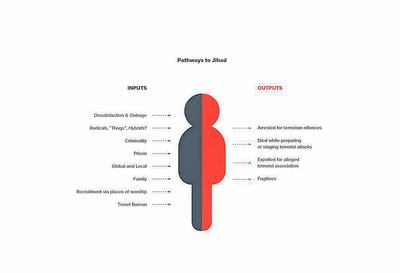Pathways into extremism in Europe may be more complex than originally thought, a new study has found.
GLOBSEC and the Counter Extremism Project have identified eight main pathways into Islamic extremism, including criminal activities, family links to extremism and the merging of personal and global issues. Importantly, the crossing of these pathways occurred for many of those studied.
The study analysed data on 310 individuals from 11 European countries arrested for terrorism offences, expelled for alleged terrorist connections, or who died while staging terrorist attacks in Europe in 2015, the year GLOBSEC calls the “peak year" for European radicalisation.

It identified the average extremist as male, young (but not a teenager), unemployed, and likely to be involved in crime, who would undergo a slow process of radicalisation which could take years and would include multiple other people, including possibly family members.
One of the findings that surprised researchers most was the link between extremism and different types of crime - thirty per cent of those studied had a criminal past. Types of crime differed according to the country they were from.
“Contrary to what other studies say, this is not a linear petty crime-redemption-embrace of jihad on behalf of the individuals in our sample,” said Kacper Rekawek, lead author on the project.
“Many are hardened criminals who committed serious, violent crimes before embracing jihadism...We sometimes get the impression that this is like changing the employer-” I did this while being a criminal, now I will do this for a jihadist cause”.“
The study’s results also bucked the idea that prisons are a breeding ground for extremism, instead finding outside influences were more likely to turn a person towards terror..
“Prisons are seen as universities of jihad in Europe but in fact, we know very little as to what is happening behind bars vis-à-vis radicalisation,” said Rekawek.
“On one hand, there are cases like A Coulibaly, radicalised by a long standing jihadi, Djamel Beghal, while in prison. On the other, and again, we are talking about France, more than two thirds of the French jihadists who had been imprisoned before embracing Salafi jihadism, had not been radicalised in prison.
“Moreover, we have seen cases in which a given individual was radicalised while in prison but this happened not because of the malign influences of their cell mates. This was the result of the ‘radicalisers’ either phoning into prison and conversing with the inmate or directly visiting prison and sitting down with the inmate in the visitors area.”
GLOBSEC has previously called European Islamic extremism a “family affair”, and its latest study holds up this assertion. Families were identified as playing a role in radicalising 21 per cent of those included in the study, with 40 per cent of families knowing about or being involved in radical activities.
Many believe the days of the radicalisation process beginning in mosques in Europe are over, but the Globsec findings say differently. “The mosque is the point of first contact between jihadist recruiters and their potential prey, effectively a scouting ground for a new pool of talent” researchers wrote, although congregations and mosque leadership were not to blame. Other places for the process to begin included gyms in France and a paintball centre and an charity for Syria in the UK.
The researchers hope that in understanding the pathways to radicalisation, more can be done to prevent people becoming a danger. They recommend identifying and curtailing the activities of ‘entrepreneurs’ - those who organise and serve as role models, propaganda disseminators and radicalisers leading terror cells or assisting people to travel and fight abroad - to fight the creation of more radicalised people. They also suggest checking in regularly with families with a record of radicalisation and identifying criminals who may straddle the extremist and criminal worlds.
The Counter Extremism Project and GLOBSEC are planning a more detailed study of 60 extremists from five European countries, to be released in June.







